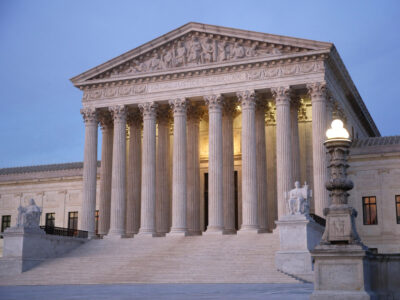Some quick reactions to W Va v. EPA
The bad and the good
Dan already has a good post up on the basics of the Supreme Court’s ruling today in the climate case West Virginia v. EPA, with initial thoughts on its implications (and more to come, I’m sure). Here are some quick thoughts from my morning’s reading of the case, in which William Boyd, Andria So and I filed an amicus brief on behalf of electricity grid experts in favor of EPA’s position.
First, the bad: The Court struck down an important and well-justified regulation aimed at limiting one of the most significant sources of climate pollution, existing power plants. It holds that it is unlawful for EPA to regulate existing power plant climate pollution by requiring generation shifting from dirtier sources to cleaner ones–which my grid expert clients and many others know to be the best, cheapest, and fastest way to reduce climate pollution from this sector. By relying on but not sharply defining the major questions doctrine as the basis for its ruling, the Court leaves EPA–and all federal agencies–less sure about what kinds of regulations courts will strike down or uphold in the future. Regulations that affect significant swaths of the economy, and that are not explicitly authorized by Congress with very specific and clear statutory language, are especially vulnerable.
Let’s call this what it is: a power grab by the Court and the judicial branch. Only courts can say which regulations require the kind of heightened scrunity and especially clear Congressional authorization language invoked here. The Court shows no deference to EPA in making this determination (and did not, in fact, reference Chevron deference at all in the majority opinion). The Court also shows no tolerance or respect for broad, general Congressional grants of power. Congress must, apparently, speak incredibly specifically in certain (not-well-defined) circumstances, rather than generally. As Richard Lazarus points out, this is a blow to the way that Congress and the Executive have historically worked collaboratively to limit important harms in complex arenas. Especially on issues as complex as climate change, we should want Congress to be able to leave important choices to agencies and the science and policy experts (and public participation processes) they employ.
I nevertheless found myself a little relieved this morning, which likely says a lot about how bad this decision might have been. “It could have been worse” is cold but real solace, given this Court and this term. It’s worth noting what’s helpful and what remains in place after today’s ruling, I think:
- It’s quite deliberately cast narrowly, as a decision striking down EPA’s interpretation and application of this statutory provision, CAA 111(d), applied in precisely this way. Roberts seems to go out of his way to limit the application of the MQD to the particulars of 111(d)’s history and statutory role. As misguided as his views are on that history and statutory role, these limitations should help future litigants fighting against the expansion of the doctrine.
- The majority also preserves EPA’s ability to continue to regulate GHGs from existing power plants, even potentially via outside-the-fenceline measures (see p.31). Whether, in fact, other outside-the-fence measures could be constructed to survive review remains to be seen.
- The case doesn’t theoretically limit Congress’s ability to delegate important decisions to agencies through revival of a robust form of the non-delegation doctrine. (In practice, given Congress’s recent gridlock and paralysis, I realize that this may be a distinction without a difference.)
- The case does not explicitly limit EPA’s ability to regulate GHGs from new and modified power plants under CAA 111, or to regulate GHGs generally from transportation and other sources. That ability may, of course, be constrained in new ways as the courts further define the major questions doctrine, but we’ll fight those fights another day.
- California’s important ability to seek and receive a waiver to enact GHG standards for cars and other transportation sources seems no worse off today than it was yesterday (I think?).
- States and localites, of course, retain lots of inherent authority to tackle climate change using powers that are untouched by this case–via electricity regulation, land use and transit decisionmaking, control of waste and ag and natural lands, building efficiency measures, etc. These local powers were never at issue in this case, but it’s good to remind ourselves of their existence in moments when we tend to hyperfocus on federal administrative authority.
I’ve already been told I’m too sanguine this morning, so I welcome thoughts in the comments about implications of the case, especially thoughts on any minefields that the decision plants.
Reader Comments
2 Replies to “Some quick reactions to W Va v. EPA”
Comments are closed.







As director of UCLA Brazil Center, and co director of the Center for Internationa Environmental Studies at teh Graduate Institute in Geneva, I can report that this ruling has just made everyone’s job beyond US borders far more difficult. Getting a handle on tropicaldeforestation and enhancing forest recovery in Amazonia (where I do most of my research ) will now be extremely difficult, undermining one of the quickest and most cost effective ways of addressing GHG emissions and also enhancing CO2 absorption in addition to the myriad environmental services that go along with this. TRopical plunder just got a big boost with the ruling.
I’ve thought the Clean Power Plan was probably doomed from the moment Trump won the election, giving him the right to appoint Scalia’s successor. We really needed Garland on the bench to win the case. So like you, I’m just relieved that it wasn’t worse.